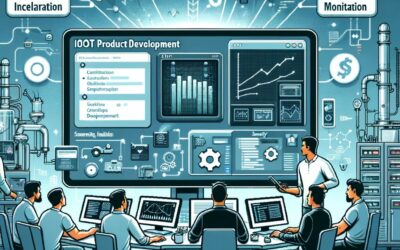Are you ready to stay on the top in the rapidly evolving DevOps landscape? The tech industry is constantly evolving and DevOps is no exception. Keeping track of the latest trends and adapting to them can give you a significant competitive advantage.
The DevOps world is constantly evolving, and the DevOps philosophy is becoming the top trend for success in the industry. For you to stay on the top, we’ve compiled a list of the top 12 DevOps practices that are set to shape the industry in 2023. Whether you’re a seasoned DevOps professional or just starting, this article will provide valuable insights about DevOps and give you the tools to stay ahead of your competitor.
How DevOps Has Transformed The Software Development?
DevOps has emerged as a game-changer in the world of software development, transforming the way software is developed, tested, and delivered. By bringing together development and operations teams in a collaborative environment, DevOps enables organizations to deliver high-quality software. As a result, it is crucial to follow the DevOps trends to increase reliability.
In the past, software development was often siloed, with developers and operations teams working in isolation and communicating only when issues arose. This resulted in longer lead times, increased costs, and decreased quality. With DevOps, the focus is on collaboration, automation, and continuous delivery. Additionally, DevOps culture encourages open communication and collaboration, allowing teams to identify and resolve issues quickly.
Stay Ahead of the Game: The Most Exciting DevOps Trends To Watch In 2023
As the DevOps industry continues to evolve, DevOps teams must stay informed about the latest trends and advancements. 2023 promises to bring exciting developments in DevOps, and these trends can help organizations to stay ahead of the curve and achieve their goals.
The DevOps industry is poised for significant growth, with a projected compound annual growth rate of 24.7% from 2019 to 2026, reaching a market value of $20.01 billion. Furthermore, this growth highlights the critical role DevOps will play in driving digital transformation across various industries.
Here are the top DevOps trends to watch in 2023:
Severless Computing
In DevOps, serverless computing is one trend that is making its mark. As a result, this approach has quickly become a top consideration for DevOps professionals looking to improve their workflows and drive innovation.
DevOps team can create code without hosting, streamlining the development, testing, and deployment process. This results in faster delivery times and improved efficiency. In addition, serverless computing helps to bridge the gap between development and operations, leading to better collaboration and communication between teams. This leads to more alignment and improved workflows, resulting in higher software quality.
Finally, serverless computing is a powerful tool for DevOps teams looking to improve their workflows and reduce expenses. It eliminates the need to own and manage infrastructure, allowing your team to focus on delivering high-quality software. With these benefits and its continued growth, serverless computing is considered a top trend in DevOps and an essential consideration for organizations looking to stay ahead of the curve.
No Code or Low Code
Low Code platforms provide a drag-and-drop interface, making it easy for developers to build, test, and deploy applications without worrying about the underlying code. Many organizations prefer a low code strategy to manage applications in a fraction of the time.
No Code solutions go further, allowing even non-technical stakeholders to create and deploy applications easily. This opens up new possibilities for collaboration, as teams can work together to build custom solutions to meet their specific business requirements. These trends significantly benefit organizations and DevOps professionals, enabling them to create high-quality applications quickly and efficiently.
DevSecOps
DevSecOps is a growing trend in the DevOps world that recognizes the importance of security in the software development process. It aims to integrate security into the entire DevOps workflow, from development to deployment, to ensure that software is delivered securely.
DevSecOps emphasizes collaboration between development, operations, and security teams to identify and resolve security risks. It also promotes automation, enabling organizations to automate security scans, vulnerability assessments, and remediation processes, freeing security teams to focus on higher-value activities.
AI Driven
The integration of Artificial Intelligence (AI) into the DevOps process has the potential to revolutionize software delivery. With the ability to analyze vast amounts of data and automate repetitive tasks, AI is changing the way DevOps professionals work.
One of the key benefits of AI in DevOps is improved test automation. AI algorithms can analyze code, identify potential bugs, and perform tests accurately than human testers. Another area where AI is making a big impact is in continuous integration and deployment. With AI-powered tools, DevOps teams can monitor code changes in real-time and automatically deploy code to production when conditions are right.
AI is mostly integrated with software to enhance functionality of it. Implementation of AI enables teams to improve automation, and also enhance collaboration amongst multiple teams.Top of Form
Infrastructure As Code (IaC)
With IaC, DevOps team can create and manage infrastructure as if it were software, using version control systems like Git to track changes and collaborate with their teams. This makes it easier to replicate and manage infrastructure across multiple environments, such as development, testing, and production.
IaC also promotes infrastructure consistency, as DevOps teams can use code to define the desired state of their infrastructure and ensure that it remains in that state. IaC enables organizations to adopt an “Infrastructure as a Service” model, where infrastructure is provisioned on demand, making it easier to scale resources as needed.
Site Reliability Engineering
SRE emphasizes a focus on improving the reliability and availability of software systems while ensuring that they are fast and responsive. It is based on the principles of DevOps, including collaboration, automation, and continuous improvement.
SRE teams use these principles to build, operate, and maintain large-scale, highly available systems that meet the needs of businesses and customers. It also emphasizes using automation, which helps organizations respond quickly to incidents and resolve problems before they escalate. In addition, SRE promotes a culture of continuous improvement, where teams are encouraged to continuously monitor and improve the performance and reliability of software systems.
Observability
Observability is the top trend in DevOps, characterized by the use of methodologies and software tools to monitor and analyze performance data from distributed applications in real time. This enables Dev and Ops teams to gather, log, correlate, and analyze large amounts of data. Also, to gain immediate insights and identify potential issues or improvement areas.
GitOps
GitOps is a top DevOps trend transforming how IT operations are managed and automated. Based on the Kubernetes paradigm, GitOps leverages the power of Git version control systems to collect, manage, and deploy applications highly automated and efficiently.
The key advantage of GitOps is that it brings together the best practices of DevOps, such as collaboration, version control, compliance, and CI/CD, and applies them to infrastructure automation. By combining the best practices of DevOps with the power of Git, GitOps enables organizations to deliver software faster and more efficiently while also improving the reliability and availability of their systems.
A Shift Towards Standardizing Deployments & Automation
DevOps professionals are increasingly adopting tools and techniques that simplify the deployment pipeline, reduce manual intervention, and promote team collaboration and communication.
Standardizing deployments refers to the process of creating consistent, repeatable, and automated procedures for deploying code and updates to production environments. DevOps teams manage their infrastructure as code (IaC) using configuration management tools such as Puppet, Chef, or Ansible
Moreover, the automation of key processes, such as testing, deployment, and monitoring, is critical to the success of DevOps. By automating these processes, DevOps teams can streamline workflows, reduce cycle times, and improve the reliability of deployments.
Multi-Cloud Environment
Organizations are moving towards hybrid cloud strategy to run on-premises and other workloads to the cloud. Having applications running across multiple cloud with multiple resources will benefit the IT enterprises. DevOps practices are not just for the hybrid cloud deployment, it will also help in security, monitoring and backups.
Developer Experience
The digitalization has brought various changes in the DevOps sector and how developers operate and enhance it. The DevOps practices play an important role in enhancement of the work environment. development. The automation of tasks and the creation of CI/CD pipelines ease the process of development.
With the adequate developer experience, it is simple to lose productivity and reliability. Various ways help enhance the developer experience, including automation tools and reformed procedures to make their life simpler.
Microservice Architecture
Microservice architecture, commonly called microservices, has become widely adopted in the IT industry. Designed to align with the latest DevOps trends, it has effectively transformed traditional large and complex applications into smaller, more manageable components.
Microservices can be developed, deployed, and managed independently, allowing for the efficient delivery of new features. This also makes diagnosing and resolving issues easier, as each micro service can be dealt with individually.
Another advantage is that microservices allow for greater scalability, as each component can be deployed and scaled independently. So, organizations can respond quickly to changing demands without having to rewrite or refactor their entire application. Microservice architecture is a critical trend in DevOps, offering organizations and DevOps professionals the ability to develop, deploy, and manage applications faster and more efficiently.
FAQs
What Is The Future Of DevOps?
DevOps has come a long way since its inception and has become an essential part of the software development process. But what does the future hold for DevOps?
As technology continues to evolve, so too will DevOps. In the coming years, DevOps practices will become increasingly automated and integrated with other technologies, such as Artificial Intelligence and Machine Learning. This integration will allow teams to streamline processes, make data-driven decisions, and improve efficiency. Another trend we will see in the future of DevOps is a focus on continuous security. As the software development process becomes faster and more complex, securing applications will become increasingly important.
By 2027, the worldwide DevOps market will expand at a CAGR of 24.59%.With this growing demand, the future of DevOps looks promising. DevOps professionals who stay informed about the latest trends and best practices will be well-positioned for success in this growing field.
What Is The Next Big Thing In DevOps?
As businesses continue to recognize the importance of digital transformation, the demand for skilled DevOps professionals is growing rapidly. The best DevOps outsourcing partner will help businesses stay ahead of the competition.
With DevOps already making a significant impact in the software industry, it’s no surprise that its trends will continue to shape and change the business landscape in the future. Containerization and micro service architecture are the top trends that allow teams to speed up the development process. All the trends mentioned above promise to bring new agility and efficiency to businesses everywhere.
Why DevOps Practices Are Trending All Across The Globe?
In recent years, DevOps has become a trending topic in software development. But why has it become so popular, and why are DevOps practices spreading across the globe?
One of the main reasons for the trend is the increasing demand for faster and more reliable software delivery. In addition, DevOps practices promote close collaboration between these teams, leading to better alignment, improved workflows, and, ultimately, higher software quality. It also enables the creation of DevOps pipeline code without the need for hosting, which streamlines the development, testing, and deployment process. Finally, DevOps provides a more efficient way of working, enabling organizations to automate many manual processes and reducing the time it takes to deliver software.
With all these benefits, it’s no wonder why DevOps practices are trending worldwide and becoming an increasingly important part of the software development process.
Conclusion
DevOps continues to be a rapidly evolving field with new trends emerging every year. From GitOps to low-code automation and cloud-native security, these trends are shaping the future of DevOps.
DevOps professionals must stay updated on the latest advancements to remain competitive and deliver better results for their organizations. Embracing and incorporating these trends into your DevOps practices can increase efficiency, speed, and security. Stay ahead of the curve and be part of shaping the future of DevOps.




